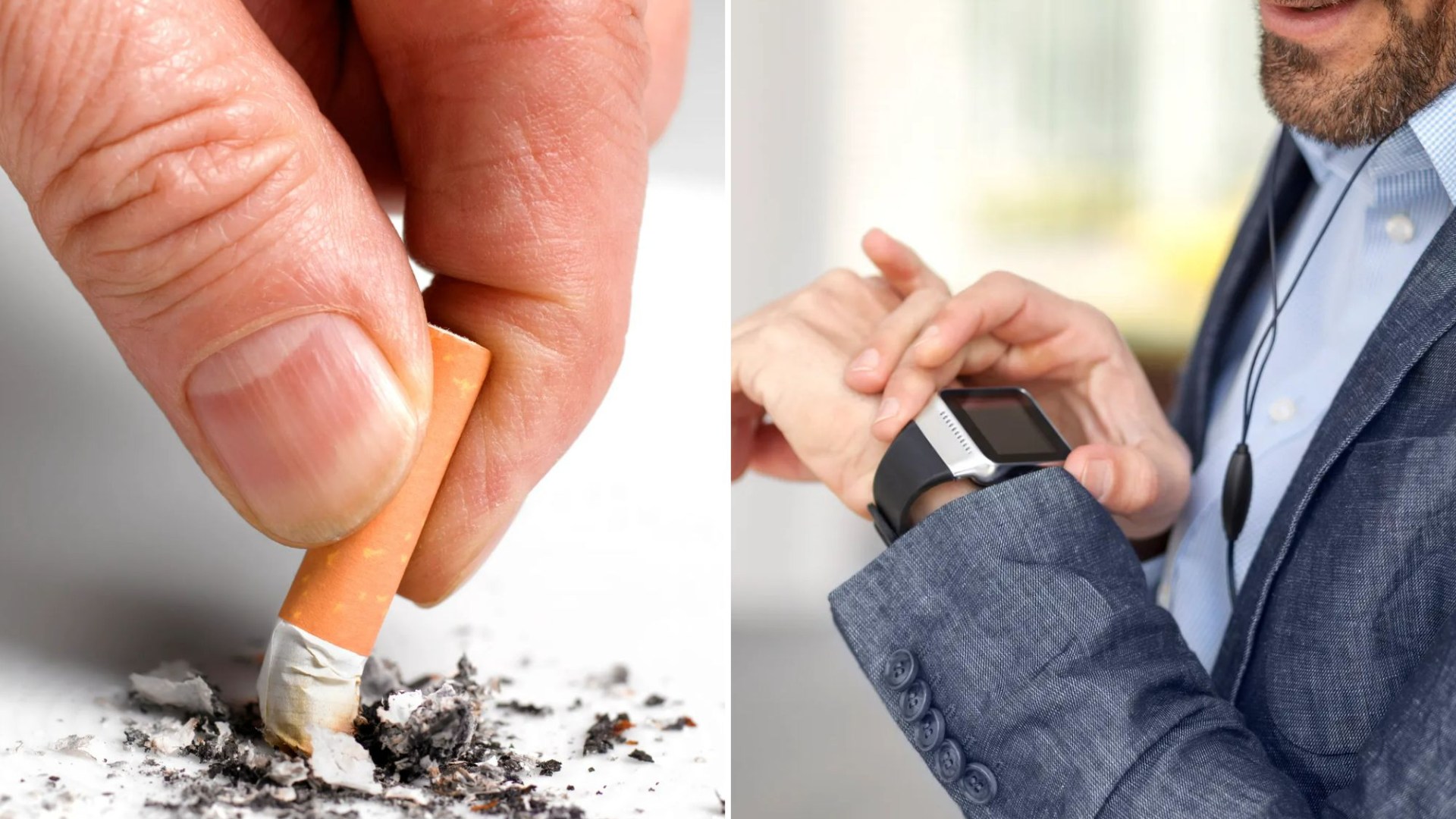THE New Year is a popular time to stop smoking – but have you tried to kick the habit more than once?
If nicotine patches or going cold turkey haven’t helped you quit smoking previously, then turning to your smartwatch could be the answer.
2
Researchers have developed a smartwatch app which intervenes when movements indicating cigarette use are detected.
The team at the University of Bristol created software that uses motion sensors on an Android smartwatch to identify the typical hand movements of smoking.
Once detected, the app delivers a vibration alert with a text message designed by smokers and former smokers, offering support about stopping smoking onto the smartwatch screen.
One message reads “Stopping smoking lets you breathe more easily.. Quitting is good”, while others contain a tally of how many cigarettes smoked and the total number of drags taken that day.
After reading the message, participants can swipe it away or press a button to display information about accessing the NHS smoking cessation support pages online.
Chris Stone, of the University of Bristol’s Tobacco and Alcohol Research Group, said: “For those who are trying to give up, an initial lapse is a vulnerable moment, and risks leading to a full relapse to smoking.
“People like smartwatches. They like the idea of it delivering a message at the point that they smoke.
“Therefore, if we can identify this point of lapse, and deliver an intervention precisely at that point, we have an opportunity to improve the success of the quit attempt.
“In carrying out this project, we have aimed to harness the latest thinking in intervention design, and deliver it in a convenient wearable package with minimal burden to the user and maximum engagement with behaviour change; and in doing so, make a difference to people’s lives.”
In the study, published in JMIR Formative Research, the smartwatch app was tested on 18 people who were interested in quitting smoking.
They wore a Ticwatch loaded with the custom app for two weeks, from the moment they woke up until they went to bed when they were instructed to charge it overnight.
The participants were also advised to remove the smartwatch while showering, swimming, or performing any activities that might damage it such as contact sports.
At the end of the two-week period, they sent the watch back and completed a questionnaire consisting of 27 questions.
In total, 66 per cent of participants said it was acceptable to wear the smartwatch with the technology, while 61 per cent of those in the study said the content of messages was relevant to them.
Positive feedback included people reporting that the app raised awareness of smoking, made them feel positive about quitting, made them stop and think, smoke slightly less and it provided constant encouragement.

2
Negative responses were that repeated messages lost effectiveness, the message did not appear quickly enough, there was not enough variety of messages and some were vague.
Alizee Froguel, prevention policy manager at Cancer Research UK, said: “Smoking is the biggest cause of cancer in the UK and stopping completely is the best thing you can do for your health.
“This study shows that smartwatches could be a useful method to help people quit smoking, but more research is needed to understand how effective they are.
“There are many tools available to help people quit, and getting support from your free local stop smoking service will give you the best chance of stopping successfully.
“To help create a smokefree future, the UK government must ensure cessation services are sustainably funded and accessible for all.”
To qualify for the study, participants had to be aged between 18 and 70, and smoke more than 10 cigarettes per day with their right hand.
People with any mobility issues affecting their right hand or arm, or those who used e-cigarettes or any form of nicotine replacement therapy during the study period, were excluded from taking part.
The researchers believe their app is the first just-in-time intervention for preventing smoking relapse that runs entirely on a smartwatch and does not need to be paired with a smartphone.
They are calling for a longer-term effectiveness trial to be carried out as the next step, which could use a greater variety of messages.
How does smoking increase your risk of lung cancer?
SMOKING cigarettes is the single biggest risk factor for lung cancer.
It’s responsible for more than seven out of 10 cases, according to the NHS.
Tobacco smoke contains more than 60 different toxic substances, which are known to be carcinogenic.
If you smoke more than 25 cigarettes a day, you are 25 times more likely to get lung cancer than someone who does not smoke.
Frequent exposure to other people’s tobacco smoke – known as passive or secondhand smoking – can also increase your risk of developing lung cancer.
Aside from cigarettes, the following products can also put you at risk of the disease:
- Cigars
- Pipe tobacco
- Snuff (a powdered form of tobacco)
- Chewing tobacco
- Cannabis (especially when mixed with tobacco)
Source: NHS




